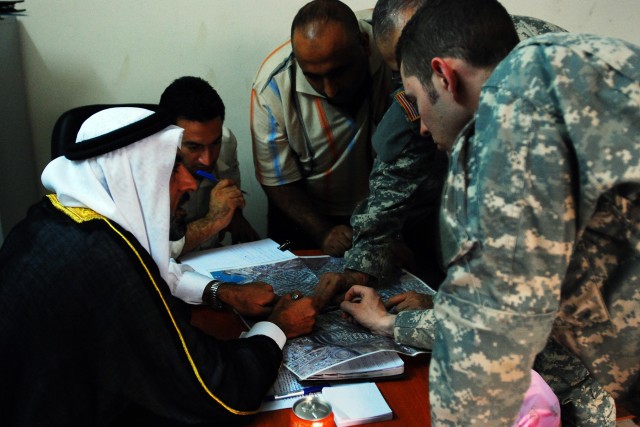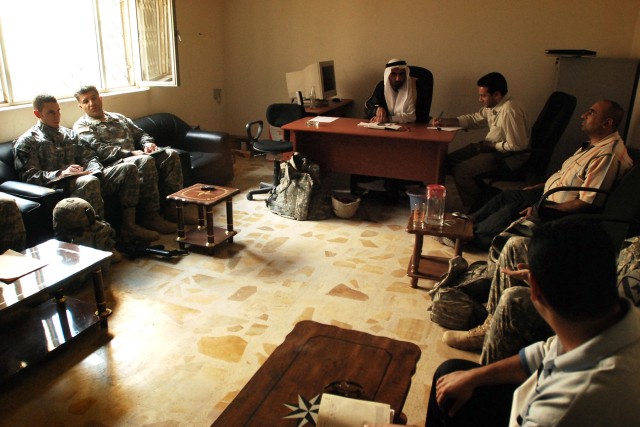BAGHDAD - Multi-National Division - Baghdad Soldiers met with the Ameriyah Neighborhood Advisory Council representatives to discuss the progress and the future plans for the community at the council's headquarters, Nov. 8.
The Soldiers, members of the 1st Battalion, 5th Cavalry Regiment, 2nd Brigade Combat Team, 1st Cavalry Division out of Fort Hood, Texas, who operate in the western Ameriyah neighborhood of the Iraqi capital attached to the 2nd Brigade Combat Team, 1st Infantry Division, met with local leaders, encouraging them to work together with the government to improve security and quality of life for Ameriyah residents.
"We are trying to build a local government here, so they can take care of their business," said Chicago native Sabah Daddah, an electrical/civil engineer working with 1-5 Cavalry.
In order to get things started, they have created a contract called Public Works Sub-Station. The PWSS will act as a mini-city hall where all the problems within the community will be addressed.
"We, the United States Army, will sponsor this Public Works Sub-Station for a period of one year, and then they will merge with the Baghdad municipal (government)," said Daddah.
A few business investors also attended the meeting. One of them wants to build a theme park, and another wants to build a small propane factory.
"Ameriyah is going to be a model. We are trying to make an example of it," said Daddah.
People in Ameriyah feel secure thanks to the efforts of Coalition Forces, Iraqi Army and a local volunteer group called Forsan Al Rafideen (Arabic for "knights of the river"), said Pesaro, Italy native Vick Karini, an architect and civil engineer working with 1-5 Cav.
"When I first got here there were 20 stores," said Karini. "Right now they have 150 stores, and they opened two restaurants two days ago. The economy is coming back.
"Personally, I admire the unit (1-5 Cavalry) for the effort they have done to keep this place safe," said Karini. "In October, we had zero of everything. No IEDs (improvised explosive devices), nobody was killed. Not even a bullet was fired against us. It's starting to get back to being a normal city, and that is really great for everybody.
"This was all in a really short time," Karini noted. "You're talking about from August until now, we changed the whole situation 180 degrees."
While other areas of the city are struggling with the water situation, Ameriyah is the only area in the Mansour District that can say it has beaten the problem, said Karini. Due to an IED, that blew a nine-foot hole into the ground, two major water pipes were broken a few months back.
"The water was running and the guys were working with water up to their necks," said Karini. "We closed them, and that was a big success for us."
There are other projects ahead that 1-5 Cav., and the council are still working on, like paving roads with the help of the U.S. Army Corps of Engineers and a health program focused on rebuilding medical clinics and getting them equipped and supplied.




Social Sharing